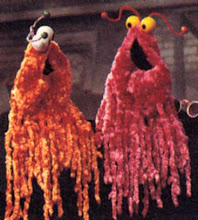it's a monday, and it does seem like the world should not have gotten up to turn on its lamps and the radio, to dress for the workday, to leave the house.
maybe the worries that are nearing us now are worries that we've just held at bay for a while -- they're there, but we're able to put on our shoes and go for walks and eat our lunches and do our jobs anyway. maybe they're new; it's hard to say, from one day to the next. there are plenty of instances -- huge or smaller, bear stearns or a lost and starved pit bull (no, i don't own a pit bull, but if you need one, i know where you can get one), two unending wars or a broken engagement -- where it seems that the world might be ready to call it a day and close up shop.
and all this worry and struggle reminded me of the poem, "paradise," which does a magnificent job of remaining in the present moment -- not only that, but finding peace in that moment -- despite the surrounding dark waters of grief and loss. it does a magnificent job, for me, of reminding me how to go on -- not "move forward," necessarily, which i'm not convinced is an apt metaphor for anything we do, especially for grieving or worrying or living in a messed-up world, because what is "progress" here? what marks or measures "progress"? progress, for the US, has often meant our own success at the expense of others. "progress," for me at least, has come from a continual mining of the past -- which is technically looking backward.
regardless of that tangent, this poem seems to me to be about how to continue, even if our actions or our words are "unreceived," even if they seem not to matter at all in the face of something unsayable, threatening, difficult, scary, or unknown. tess gallagher wrote this book after her husband, raymond carver, died, and it's one of the most beautiful books i've ever read. the title of this poem, while possibly ironic at first glance, seems more and more appropriate and not ironic the more often i read it. this poem has always given me a moment of sorrowing peace, if that's a good enough phrase for it.
Paradise
~ Tess Gallagher
Morning and the night uncoupled.
My childhood friend
who had been staying awake for me, left the house
so I could be alone with the powerful raft of his body.
He seemed to be there only for listening, an afterlife
I hadn't expected. So I talked to him, told him
things I needed to hear myself
tell him, and he listened, I can say "peacefully,"
though maybe it was only an effect he had, the body's surety
when it becomes one muscle. Still, I believe I heard
my own voice then, as he might have heard it, eagerly
like the nostrils of any mare blowing softly over
the damp presence he was, telling it
all is safe here, all is calm and yet to be endured
where you are gone from.
I spoke until there was nothing unfinished between us.
Since his feet were still there and my hands
I rubbed them with oil
because it is hard to imagine at first
that the dead don't enjoy those same things they did
when alive. And even if it happened only as a last thing, it
was the right last thing.
For to confirm what is forever beyond speech
pulls action out of us. And if it is only childlike and
unreceived, the way a child hums to the stick
it is using to scratch houses into the dirt, still
it is a silky membrane and shining
even to the closed eye.
(published in Moon Crossing Bridge, Tess Gallagher, Saint Paul: Graywolf Press, 1992.)
i've been paying particular attention to the rhythms of language and of line breaks here, in this read-through, and i find them incredibly careful. for example, the line, "things I needed to hear myself" doubles beautifully -- the speaker is not only talking, then, to her husband, but recognizing through line break that she's talking to herself, saying things she needs to say, needs to hear. the way words are put together, here, too, is very powerful: saying, for example, "Since his feet were still there and my hands/I rubbed them with oil" is very different in tone, rhythm, and meaning than saying, "Since his feet were still there, I used my hands to rub them with oil." in the first (and actual) phrasing, the antecedent for "them" could be both the hands and the feet -- there's far more merging of the two than separation in this phrasing. if it were the other way, the speaker's hands are more distinctly separate from her husband's feet, not nearly as blended, not nearly so much one body, one spirit, "one flesh" -- one person resisting separation again into two.
there. i'm starting to feel a little better. the world isn't mended, but one moment is, at least. and yes, i'm going to order and read very soon the book Against Happiness: In Praise of Melancholy. seems like that oughta be the title of this whole blog...
Subscribe to:
Post Comments (Atom)

2 comments:
Thank you.
love this poem!
Post a Comment